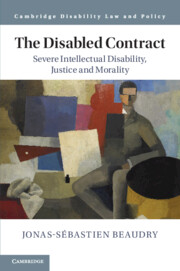Book contents
- The Disabled Contract
- Cambridge Disability Law and Policy Series
- The Disabled Contract
- Copyright page
- Dedication
- Epigraph
- Contents
- Foreword
- Acknowledgments
- 1 Severe Intellectual Disability and the Social Contract
- 2 Inclusive Contractarianism
- 3 The Capacity to Trust as a Contractual Basis for Robust Moral Status
- 4 People with Severe Intellectual Disabilities as Active Citizens
- 5 People with Severe Intellectual Disabilities as Passive Citizens
- 6 Other-Regarding Concern and Exploitation
- 7 Beyond Contractual Relations
- Bibliography
- Index
4 - People with Severe Intellectual Disabilities as Active Citizens
Published online by Cambridge University Press: 15 March 2021
- The Disabled Contract
- Cambridge Disability Law and Policy Series
- The Disabled Contract
- Copyright page
- Dedication
- Epigraph
- Contents
- Foreword
- Acknowledgments
- 1 Severe Intellectual Disability and the Social Contract
- 2 Inclusive Contractarianism
- 3 The Capacity to Trust as a Contractual Basis for Robust Moral Status
- 4 People with Severe Intellectual Disabilities as Active Citizens
- 5 People with Severe Intellectual Disabilities as Passive Citizens
- 6 Other-Regarding Concern and Exploitation
- 7 Beyond Contractual Relations
- Bibliography
- Index
Summary
This chapter assesses five strategies that contractualist thinkers have put forward to conceptualize PSID as active participants to the social contract. These focus on (1) PSID’s talents; (2) their capacity to have a conception of the good; (3) their ability to engage with others or play a part in society; (4) their potential to develop (further) contractual capacities; and (5) their need for assistance by ‘collaborators’ or ‘cognitive prostheses’ in the nurturing and exercising of these capacities. These strategies attempt to ‘normalize’ PSID by modifying the benchmark requirements for counting as a contractor; or by arguing that PSID do meet these requirements, despite appearances to the contrary. While they are promising in terms of its application to less seriously disabled individuals, I find that social support, including ‘mental prostheses,’ is not a plausible solution for many profoundly disabled individuals, unless this support is conceptualized in a way that alters it beyond recognition or takes it beyond the autonomy-based contractualist paradigm to which it purports to be attached.
- Type
- Chapter
- Information
- The Disabled ContractSevere Intellectual Disability, Justice and Morality, pp. 128 - 162Publisher: Cambridge University PressPrint publication year: 2021

